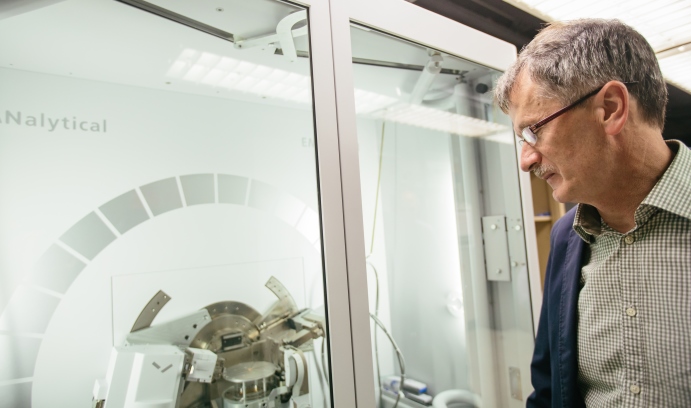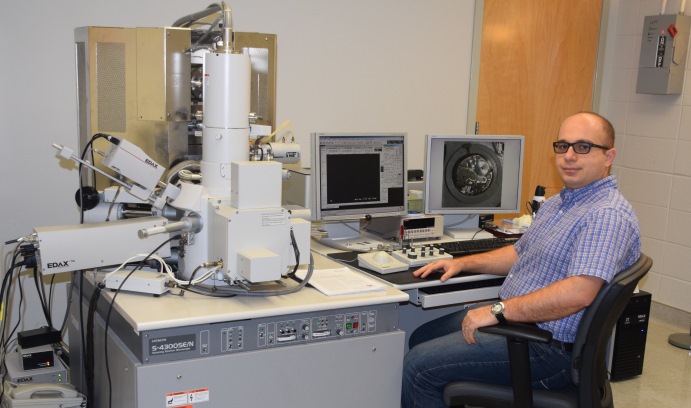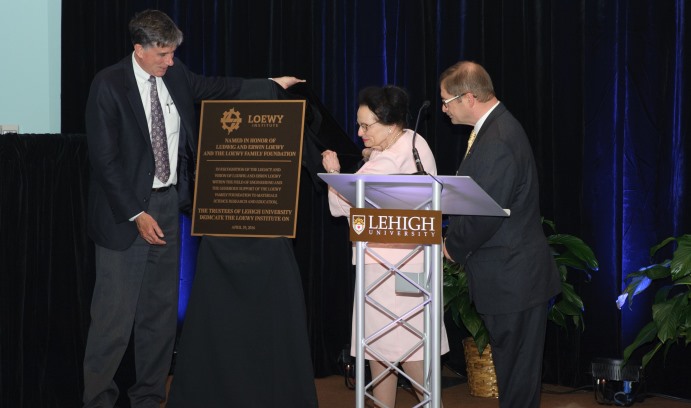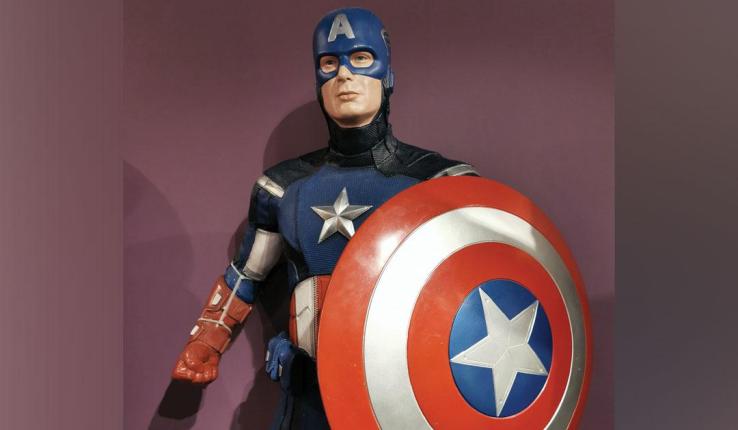A global era for materials processing

Adam Bunsch, a Visiting Professor at the Loewy Institute, is conducting research here with Lehigh’s new Empyrean PANalytical X-Ray Diffractometer, which takes qualitative and quantitative measurements of crystalline materials. (Photo by Christa Neu)
Lehigh rededicated one of its research institutes recently, strengthening its longstanding ties to a family that helped win World War II, transform the aerospace industry and shape much of modern manufacturing.
Besides paying homage to Ludwig and Erwin Loewy, the Czech-born brothers who contributed to the victory over Nazi Germany, the university also honored Lehigh officials who have helped keep the Loewy legacy alive.
In a ceremony in Whitaker Laboratory, faculty members from two colleges and members of the office of advancement rededicated the Loewy Institute, which had been known since its founding in 1970 as the Institute for Metal Forming.
The Loewy Family Foundation has supported teaching and research at Lehigh since 1993, said Wojciech Misiolek, director of the Loewy Institute and Loewy Chair in Materials Forming and Processing. The foundation’s generosity has benefited countless students and faculty members while enabling them to build networks of collaboration with peers in Europe, South America, Asia and Australia.
The Loewy Visiting Professorship and the Loewy Graduate and Postdoctoral Fellowships enable two or three scholars, and sometimes as many as half a dozen, to conduct research at Lehigh each academic year, said Misiolek (see sidebar). The foundation also endows the Loewy Laboratory Equipment Fund.
“The research we are pursuing with endowed support from the Loewy Family Foundation has raised our international profile, facilitating exciting collaborations and providing powerful leverage for success in securing external research funding,” said Misiolek.
The renewal of the Loewy family’s support, said Misiolek, will enable the research institute to continue expanding its research into newer areas such as biomaterials, medical devices, structure materials and 3D printing.
The institute’s success would not have been possible, said Misiolek, without the Loewy brothers’ ability to read the political winds crossing Europe in the 1930s and the willingness of Lehigh’s leaders to seize an opportunity that other universities passed up.
Ludwig and Erwin Loewy were born into a Jewish family in 1887 and 1897 near Pilsen in what is now the Czech Republic and was then part of the Austro-Hungarian Empire. Both earned engineering degrees from Charles University in Prague.
After designing diesel engines for transatlantic ocean liners for a German company in Berlin, Ludwig Loewy joined the Schloemann Company in Düsseldorf, Germany, where he designed machine tools, rolling mills and hydraulic presses. In 1921, he bought majority interest and became the company’s controlling partner. Erwin Loewy joined in 1925 as sales manager.
It did not take the Loewy brothers long, said Misiolek, to leave their mark on Germany’s extrusion and forging industries. (Extrusion is the process by which materials are pushed through a die to make objects of desired and often complex shapes. Forging is the process by which metal is compressed, usually under heat and pressure, to obtain high-strength parts for cars, aircraft, machines, tools, weapons and other applications.)
“In the early 1930s,” said Misiolek, “our German predecessors were putting forth intensive research and development efforts to improve the capabilities of their forging and extrusion presses for the needs of the aviation industry.
“Among the best-known press designers at that time was Ludwig Loewy.”
In 1933, Adolf Hitler was named chancellor of Germany. The ascension of Hitler’s Nazi Party, along with the growth of anti-Semitism in Germany, was a warning the Loewy brothers could not ignore, said Brigitte Loewy Linz, president of the Loewy Family Foundation and daughter of Erwin Loewy.
“With the rise of the Nazis in the mid-1930s,” Linz said at the rededication ceremony, “Ludwig left Germany and went to England, where he established the Loewy Engineering Co. Ltd. Erwin stayed [in Germany] until the fateful day in 1935 when someone took a pot shot at him while he was on his way to have a date with my mother.
“He left for England immediately, and my mother joined him there. They were married in Bournemouth [and] they settled in Paris, France, where my father established a new engineering company.”
The Loewys’ exile cost the German military effort in World War II, said Linz and Misiolek.
“Both Ludwig and Erwin worked diligently to persuade the governments of their adopted homes to build extrusion presses for the production of airplanes for national defense,” said Linz. “These aircraft were later decisive in the outcome of World War II.”
“Ludwig and Erwin began designing and producing extrusion presses that were used to manufacture crucial airplane parts for the British military, including the famous Spitfires,” said Misiolek.
Erwin Loewy and his family emigrated to the United States in 1940. Ludwig Loewy died of cancer in 1942. Following the end of World War II, Erwin managed the family’s businesses and created several more. In 1955, Loewy manufactured a 50,000-ton and a 30,000-ton forging press. The Loewy Hydropress Company designed the first motion simulator for the Polaris missile and the first launch pad for the Vanguard rocket.
After Erwin Loewy died in 1959, his surviving siblings decided to form a foundation that would honor Ludwig and Erwin by supporting philanthropy in education, innovation and public service. The Loewy Family Foundation was established in 1986; Linz’s late husband, Andrew, was named its first president, and the foundation began looking for a university to support.
“Our board…approached many major engineering schools, such as M.I.T., Harvard and Rensselaer,” said Linz. “None were interested. One day, the family’s accountant was telling his daughter, Karen Pantleon, a Lehigh alumna [Class of 1985], about the situation, and she suggested that we contact Peter Likins [Lehigh president, 1982-97], who was most receptive to the idea.”
Betzalel Avitzur, professor emeritus of materials science and founding director of the Institute for Metal Forming, became Lehigh’s first Loewy Chair in 1993 and was succeeded in 1997 by Misiolek.
Many people at Lehigh have contributed to the creation of the Loewy Institute, said Linz. Many attended the rededication ceremony.
“Names that come to mind are Steve Cutcliffe and Gail Cooper [professors of history], who helped organize a Loewy Exhibit that graced the entry hall of Whitaker Lab for a short time,” said Linz.
“Of great importance was the assistance of the librarians—Marie Boltz, Phil Metzger, Lois Fischer Black and Ilhan Citak, who helped conserve my dad’s personal papers in Special Collections.
“Most important of all have been the ladies in the advancement office, who have all become dear friends. Christine Smith [associate vice president] sent us a wonderful proposal. Then came Rochelle Goodman and recently her successor, Kathy Zimmerman. I am grateful to all of them.”
Story by Kurt Pfitzer
Posted on:






